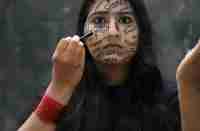Teachers’ religious beliefs shouldn’t trump students’ rights to educational secularism (and welfare)
Despite being formally dismissed from his teaching role last week following a disciplinary hearing, Enoch Burke appeared on the grounds of Wilson’s Hospital School (yet again) on Tuesday.
The controversy surrounding Burke first made headlines last year, when his opposition to referring to a student by their preferred pronouns and chosen name – due to Burke’s religious beliefs – led to clashes with management, his conduct ultimately landing him a suspension. This suspension was not adhered to however, with Burke showing up on the school grounds on several occasions thereafter – even when the school secured High Court orders to bar him from doing so.
The controversy surrounding Burke has gained a lot of exposure, not just because of the nature of his initial objections and his blatant non-compliance with court orders, but also due to the chaotic scenes that played out with other members of the Burke family at the teacher’s recent disciplinary meeting. Enoch’s family share his position that he’s being religiously discriminated against in losing his teaching post, as his basis for refusing to recognise the student’s preferred gender identity is that doing so would violate his evangelical Christian beliefs. But this case is not about Burke’s views on trans/non-binary people, whether religiously based or not.
Burke was not fired, jailed, or even suspended because of his views. His suspension was linked to unprofessional behaviour in the weeks following the circulation of a school-wide email which asked that teachers address a student by a new name and use their preferred pronouns. According to the school, after already objecting via email, Burke then interrupted a school chapel service in June, calling for the then-principal to withdraw the instruction. As a result of this and more alleged confrontational behaviour, “serious concerns” expressed by the school’s board of management led to Burke’s eventual suspension.
And so far, Burke’s behaviour post-suspension has only served to validate such concerns, with the teacher having now turned up to the Westmeath school on a number of occasions in recent months. It was this ignoring of his suspension that eventually led to Burke being arrested in late August and jailed for contempt of court. Any teacher acting in the way Burke did, irrespective of the initial issue, would (and should) have faced the same consequences – his views on ‘pronouns’ are not what’s relevant there.
But Burke’s views nonetheless have become a focal point in discourse surrounding him. When the story made national and international headlines, too much media coverage misrepresented his personal plight as being solely based on his anti-trans views, when this is just not the case. Perhaps if Burke hadn’t publicly confronted school authorities, instead expressing his objections more appropriately, and the school had still moved against him, then he would be closer to progressing the case for religious discrimination that he wants to make.
But even if this were the case, can his initial stance really be justified? Can we say that the right to personal religious beliefs of any teacher supersedes any student’s rights to personal beliefs and personal expression? Especially here, considering how recognising students’ gender expression is intrinsically linked to their welfare, as according to a 2018 study, for each additional context (at home, school, work, socially, etc.) in which a transgender youth’s chosen name and pronouns are used, their risk of suicidal behaviour is reduced by more than half.
Burke did not have the student whom the email referred to in any of his classes. Conceivably, he could very well have continued his teaching without ever having to encounter a situation where he’d have to choose between his views and the administration’s instruction. Burke is not exercising his right to freedom of religion so much as demanding the school’s compliance with valuing his personal beliefs over the welfare of its student.
Burke is entitled to his religious views and personal beliefs on gender, but so too are students equally entitled to personal expression and their own beliefs on gender. As I see it, if the school had indeed listened to Burke and completely withdrawn their school-wide instruction as he requested, it would blatantly imply that faculty’s religious beliefs trump the personal beliefs of their students on an administrative level. And in the interest of Church and State, this would be unacceptable.
Surely it’s a truism to say religious ethos should have no place in our education systems. The religious beliefs of any person at any administrative level in our schools should not unduly influence protocol or students’ experience. Burke’s request to withdraw the instruction, if granted, would have meant exactly this; his religious beliefs would’ve been the sole cause for schoolwide protocol being reversed, plausibly to the detriment of the student’s experience. Again, Burke could arguably have continued his work without ever compromising his religious ideals as, since he didn’t teach the student, having to address them wasn’t going to be a day to day issue.
The ramifications being faced by Burke have arisen as a direct result of his unprofessional and illegal actions, not because of his particular views – and it’s important to highlight that. However, to say the inappropriate way Burke approached all of this (including his objection) is the sole reason the school were right to not accommodate them, is also untrue.
Our education system continues to suffer from being overly entwined with religion. As of 2021, about 88% of the State’s schools remained under Catholic patronage, the number of Catholic schools falling just 2% over eight years despite various government commitments. It’s a slow process, but we are aiming to move towards secularised education, and the school accommodating Burke’s request would’ve been akin to a ‘backslide’ in this regard.
This is not, as Burke maintains, a case of a teacher’s right to religious freedom not being recognised in the workplace. This is a case of a teacher trying to claim that his personal religious views trump the school’s protocols and the personal beliefs and welfare of its students – and then subsequently acting in blatant contempt of the school administration and of court orders.
Burke claims the school’s actions amounts to “abuse of children”; a lofty accusation and an ironic one considering the school is the ‘side’ acting in the interest of its students, and Burke is the one showing up at a school he’s no longer employed at (and in defiance of court orders).
Accommodating or placating people like Burke would set a very bad precedent, both in terms of student welfare and educational secularism, so it is a relief to see this situation play out as it has. However, it also highlights the fact that while the Irish education system is ‘on paper’ removing itself from religion, there are still people and facets within it that try and uphold the established religious ethos’ to the detriment of some students’ beliefs and rights.






